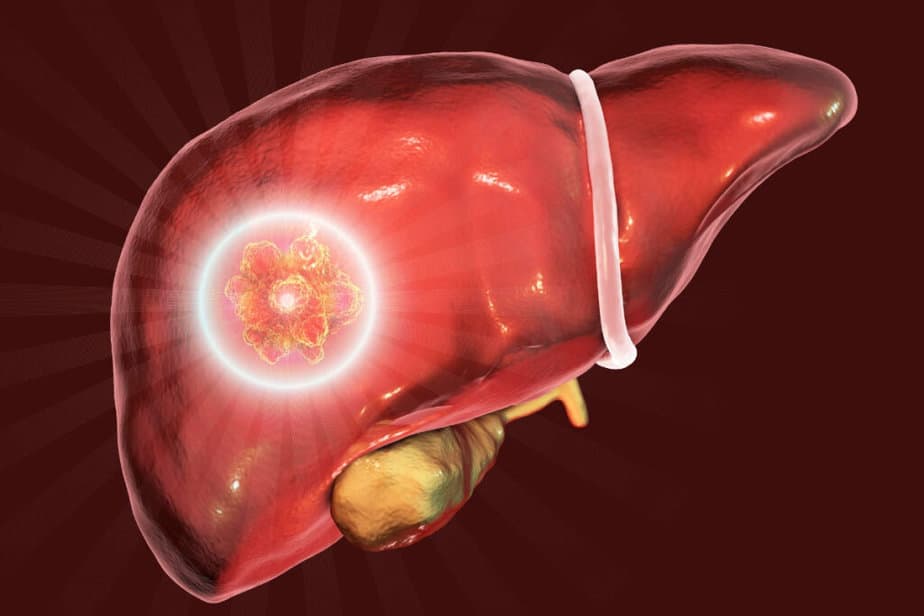Primary liver cancer is generally not discovered early, likely because there are few signs and symptoms in the early stages. The prognosis is often poor, and liver cancer does not respond well to treatment.
However, by protecting yourself from cirrhosis and chronic viral hepatitis – the two leading causes of the disease – you can greatly reduce your risk of developing liver cancer.
Note that primary liver cancer – which originates in the liver – is different from metastatic liver cancer.
Metastatic cancer only occurs when tumors from other parts of the body spread to the liver. Metastatic disease is not considered liver cancer.
- Related article: Guide to Liver Health
Liver Cancer Signs and Symptoms
Because most people do not exhibit symptoms early on, liver cancer usually remains undetected until it has reached the advanced stages.
For those who do experience symptoms, they may include:
- A yellow discoloration of the skin and whites of the eyes (jaundice or icterus)
- Abdominal pain, especially in the upper right part of the abdomen
- Abdominal swelling (ascites)
- An enlarged liver
- General weakness and fatigue
- Gastrointestinal bleeding
- Loss of appetite
- Nausea and vomiting
- Weight loss
- What Causes Liver Cancer?
Liver cancer begins in the liver cells when they start to grow abnormally. Why this happens is not entirely understood, however, researchers suggest that liver cancer begins with damage to DNA.
Inflammation and scarring in the liver, which occurs in cirrhosis and chronic hepatitis can lead to DNA damage in liver cells.

Liver Cancer Risk Factors
While primary liver cancer affects both sexes (but men more often than women) and all ages and races, certain factors increase the risk:
- Aflatoxin exposure (foods contaminated with fungi that produce aflatoxins such as corn, peanuts, and soybeans)
- Age: average age in the United States for a liver cancer diagnosis is 60
- Bile duct disease (i.e. primary sclerosing cholangitis)
- Chronic hepatitis B infection (HBV)
- Chronic hepatitis C infection (HCV)
- Cirrhosis
- Diabetes
- Excessive alcohol consumption
- Smoking
Screening for Liver Cancer
The American Association for the Study of Liver Diseases recommends liver cancer screening for high risk people including those who have:
- An inherited form of hemochromatosis
- Cirrhosis from any cause
- Primary sclerosing cholangitis
- Hepatitis B and one or more of the following: are an Asian male older than 40, an Asian female older than 50, or an African and older than 20, or have a family history of liver cancer
- Hepatitis C
Learn more about What Causes Cirrhosis of the Liver.
Diagnosing Liver Cancer
A variety of tests and procedures are used to diagnose liver cancer including:
- Blood tests,
- Computerized tomography (CT) scanning
- Biopsy on liver
- Magnetic resonance imaging (MRI)
- Ultrasound (ultrasonography).
For the majority of patients with cirrhosis, ultrasound and AFP (a blood tumor marker) are checked every 6 months.
In some patients with obesity, ultrasound views are limited, and your doctor may recommend screening with CT or MRI.
If a lesion over 1 cm in size is detected on ultrasound, this needs close follow up with CT or MRI to better characterize the lesion.
In some cases, imaging characteristics are enough to confirm a diagnosis of liver cancer. If the diagnosis is in question, a biopsy of the lesion may be performed.
Primary Liver Cancer Treatments
While the goal of treatment is to completely eradicate liver cancer, the focus may turn to preventing the tumor from growing and/or spreading when complete eradication isn’t possible.
Depending on the stage of liver cancer, palliative care – relieving symptoms and making patients as comfortable as possible – may be the only option.
Various treatment options include:
- Chemotherapy
- Cryoablation (cryosurgery or cryotherapy) uses extreme cold to destroy malignant cells
- Liver transplantation
- Pure alcohol injection directly into tumors
- Radiation therapy – high-powered energy beams to destroy cancer cells and shrink tumors
- Radiofrequency ablation – an electric current is used to destroy cancerous cells
- Surgery to remove malignant liver tissue without replacing the whole liver
Liver Cancer Prevention
By taking steps to protect yourself from developing cirrhosis or from contracting hepatitis B and C, you can significantly reduce your risk of developing liver cancer.
Abstaining from alcohol and maintaining a healthy diet, exercising and working towards a normal BMI can help reduce the risk of developing cirrhosis from alcoholic or non-alcoholic liver disease.
Vaccination, which provides over 90% protection for both adults and children, is an effective way to prevent hepatitis B.
Since there is no vaccine for hepatitis C, the only way to prevent the disease is to reduce the risk of exposure to the virus.
Avoiding behaviors such as sharing drug needles or personal items like toothbrushes, razors, and nail clippers with infected person(s) is recommended.
Also, avoiding tattoos, unscreened blood products (in countries outside the U.S., and high risk sexual partners) can help protect against hepatitis C.
Avoiding unnecessary medications and herbal supplements may help reduce the risk of drug induced liver injury.
Your liver is one of the most powerful organs in your body. It is capable of regenerating itself to a certain degree. Focusing on your liver health is always a good idea, but when you are diagnosed with primary liver cancer your focus becomes critical.
Learn more about the liver and various diseases:

